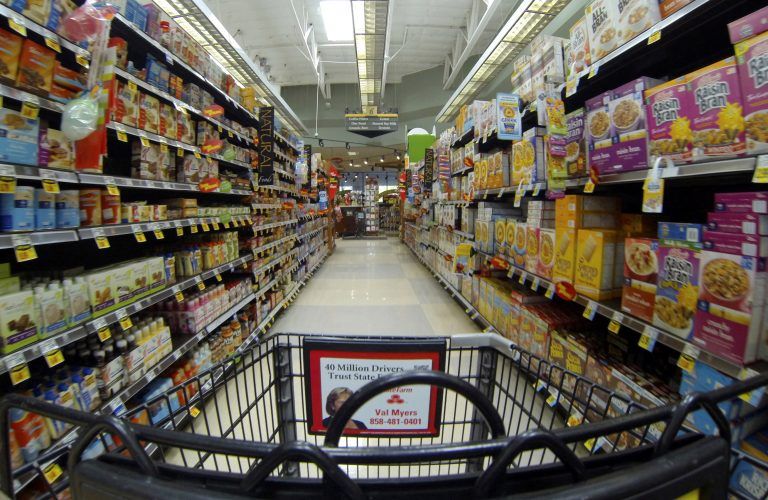
As inflation continues to plague the Greek economy, with food costs straining already struggling households, OT.gr identifies the 14 main reasons driving rising costs.
According to the analysis, based on examining a slew of aggregated data from the Hellenic Statistical Authority (ELSTAT), and analyses from economists and scientific organizations, persistent inflation is rooted in 14 causes with 8 of these reflecting long-standing problems in the Greek economy and market.
The Greek economy is facing 8 chronic impediments fuelling inflation which can be distilled to a mix of Greed for profits by businesses “Greedflation”, dependence on domestic production and consumption on imports, the pandemic, the energy and climate crisis, along with low wages.
According to economists and market pundits, food prices are expected to remain at high levels globally. However, in Greece, the impact of inflation is anticipated to be more pronounced, primarily due to low wages. The sources of inflation in Greece are numerous and are rooted in structural weaknesses, including:
- Οngoing challenges in the supply chain, contributing to increased costs.
- The economic downturn and financial constraints faced by consumers.
- Import dependencies, affecting pricing dynamics in the domestic market.
- Oligopolistic market structures result in limited competition.
- Fluctuations in international commodity prices influence local costs.
- External factors like geopolitical events affect the availability of goods.
- Inefficient agricultural practices affect local production and supply.
- Climate-related challenges impacting agricultural productivity.
- The intricate network of intermediaries in the distribution chain.
- Regulatory issues and taxation affect the overall cost structure.
- Despite measures taken by the government to buttress Greek households, economists concluded, speaking to OT that if real income did not rise “inelastic demand” – a metric measuring the unchanged consumer buying habits despite price fluctuations – for food products and essential goods would continue to “feed” high costs.
According to the official data from the Hellenic Statistical Authority (ELSTAT), food prices increased by 30% from May 2021 to November 2023 reflecting the current economic situation in the country.
The novel idea of “Greedflation” – a controversial and often polarizing theory that claims businesses exploit inflation to create excessive profits – is also cited by some domestic institutions, like the Bank of Greece (BoG), as well as international entities as a possible reason for dogged inflation.
This is because high profits further fuel the rise in prices within an environment of extensive inflation. Calls have been made to heighten controls to combat profiteering, while businesses are urged to limit profit margins wherever possible.
An Alpha Bank report underlines the inflation risks linked to geopolitical tensions, substantial wage increases, and the fiscal cost of extreme weather events in the Eurozone, estimating high costs will persist.
Economic studies such as those by the Foundation for Economic and Industrial Research – ΙΟΒΕ, Bank of Greece, etc. highlight a substantial rise in input costs. For instance, the increasing cost of imported energy has further intensified inflationary expectations, potentially facilitating businesses in passing on their increased costs to consumers.
Source: tovima.com
Latest News

New Exposé by Domumento Reveals Nefarious Triangular Link of ‘Black Money’ with New Democracy, Blue Skies, & Truth Team
The latest exposé by the Documentonews.gr news site lays bare what appears to be a surreptitious path of indirect financing of ND through the business sector—transactions that, as widely understood, rarely occur without expectations of reciprocal benefit

PM Meloni Meets Vice President Vance in Rome Signalling Optimism on Ukraine Talks
Meloni emphasized the strength and strategic value of the Italy-U.S. partnership.

Airbnb: Greece’s Short-Term Rentals Dip in March Amid Easter Shift
Data from analytics firm AirDNA shows that average occupancy for short-term rentals dropped to 45% in March, down from 49% the same month last year.

Easter Week in Greece: Holy Friday in Orthodoxy Today
At the Vespers service on Friday evening the image of Christ is removed from the Cross and wrapped in a white cloth

Meloni and Trump Meet in Washington, Vow to Strengthen Western Ties
“I am 100% sure there will be no problems reaching a deal on tariffs with the EU—none whatsoever,” Trump stressed.

ECB Cuts Interest Rates by 25 Basis Points in Expected Move
The ECB’s Governing Council opted to lower the deposit facility rate—the benchmark for signaling monetary policy direction—citing an updated assessment of inflation prospects, the dynamics of underlying inflation, and the strength of monetary policy transmission.

Current Account Deficit Fell by €573.2ml Feb. 2025: BoG
The improvement of Greece’s current account was mainly attributed to a more robust balance of goods and, to a lesser extent, an improved primary income account

Hellenic Food Authority Issues Food Safety Tips for Easter
Food safety tips on how to make sure your lamb has been properly inspected and your eggs stay fresh.

Greek Kiwifruit Exports Smash 200,000-Ton Mark, Setting New Record
According to data by the Association of Greek Fruit, Vegetable and Juice Exporters, Incofruit Hellas, between September 1, 2024, and April 17, 2025, kiwifruit exports increased by 14.2%.

Easter Tourism Boom: Greece Sees 18.3% Surge in Hotel Bookings
Among foreign markets, Israel has emerged as the biggest growth driver, with hotel bookings more than doubling—up 178.5% year-on-year.







![Πλημμύρες: Σημειώθηκαν σε επίπεδα ρεκόρ στην Ευρώπη το 2024 [γράφημα]](https://www.ot.gr/wp-content/uploads/2025/04/FLOOD_HUNGRY-90x90.jpg)





![Airbnb: Πτωτικά κινήθηκε η ζήτηση τον Μάρτιο – Τι δείχνουν τα στοιχεία [γράφημα]](https://www.ot.gr/wp-content/uploads/2024/07/airbnb-gba8e58468_1280-1-90x90.jpg)











![Επιχειρήσεις: Με τι επιτόκιο δανείζονται – Πώς θα ξεκλειδώσει περισσότερη ρευστότητα [γράφημα]](https://www.ot.gr/wp-content/uploads/2025/04/daneia-trapezes-768x432-1-600x338.jpg)














 Αριθμός Πιστοποίησης
Αριθμός Πιστοποίησης